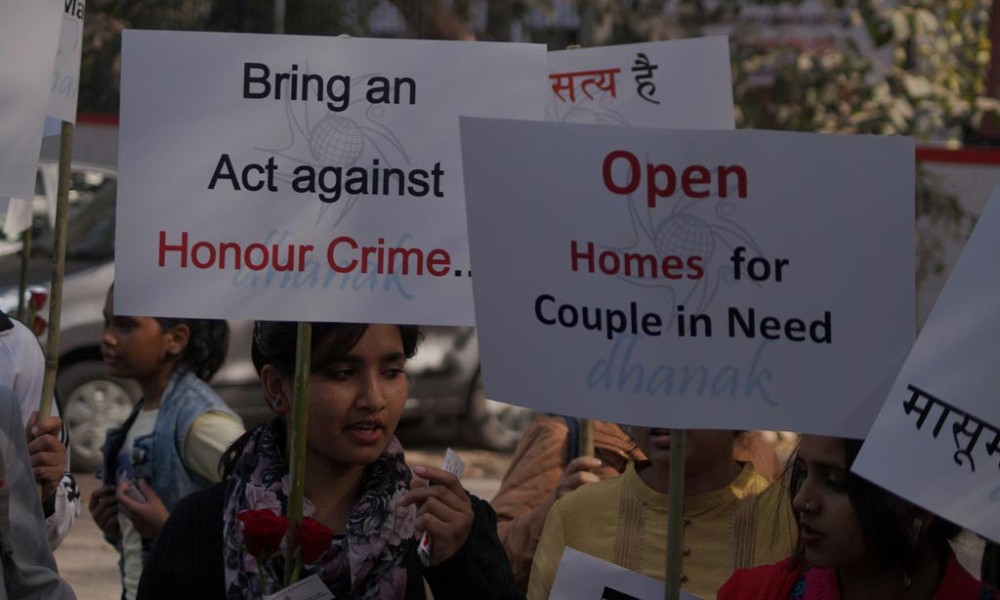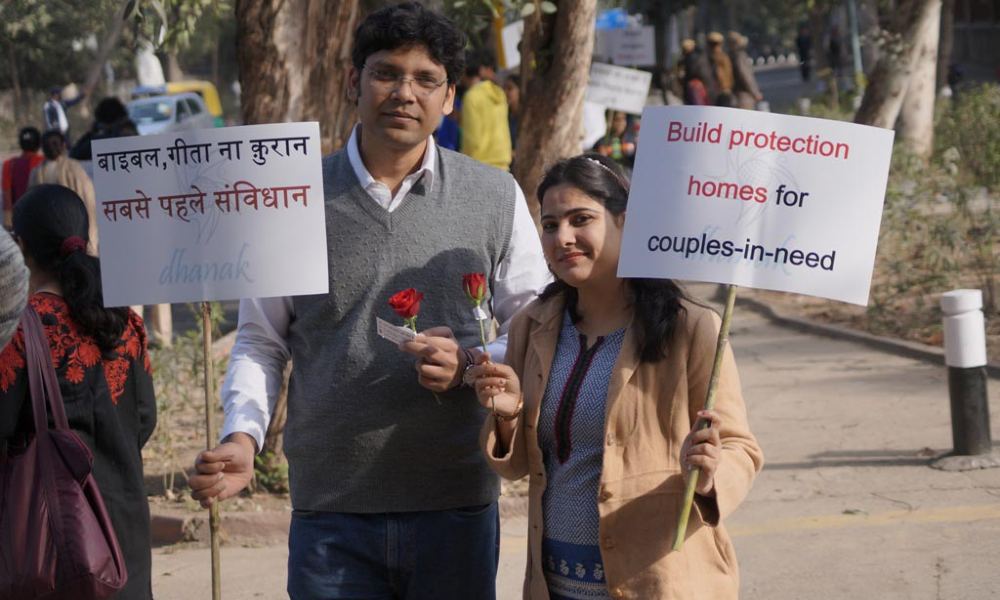Inter-faith couples have been fighting against differential treatment of marriages registered under the Special Marriages Act (SMA).They say certain provisions of the act violate the right to equality and right to privacy.
Despite Chief Justice of India, D Y Chandrachud’s remarks questioning the validity of the mandatory 30- days notice period under the Special Marriages Act, couples continue to struggle with solemnizing their marriage under the Act.
The Special Marriages Act allows solemnization of inter-religion and intra-religion marriages without the requirement of renouncing the religion of any of the partners seeking the registration of marriages. The Act has provision for civil marriage for people of India and all Indian nationals in foreign countries, irrelevant of the religion or faith followed by either party.
However, couples seeking solemnization of marriage under the Act say that apart from the resistance from families of inter-faith couples, there are several loopholes in the act that make the registration process harder.
Asif Iqbal, founder of Dhanak, a Non-governmental Organization (NGO) working for inter-faith and inter-caste couples said, “Couples find it difficult to register their marriages in their native places, so because of that they come to us. Last year an inter-faith couple from Odisha came to Dehradun to get their marriage solemnized.” The biggest challenge, apart from moral policing and the rise in vigilantism, is the 30 days notice period that has to be served under SMA before solemnizing their marriage.
Nida Rehman, who met her partner, Mohan during college faced several challenges from not just the civil society but also from the authorities. Nida said, “There are several challenges that we faced as an inter-faith couple. When I wanted to register my marriage, authorities were guiding me morally about my duties towards my parents. They wrongfully cancelled our marriage affidavits just because we did not mention our respective religions.” Mentioning the religions under the SMA is not mandatory.
Nida has now challenged two sections of the Act in the Supreme Court. These are sections that deal with the notice period and that call for objections to the marriage.
However, not every inter-faith couple has the same story and problems. Aliya Abbas and Saurabh Bhhatracharya got married under the SMA but apart from societal pushback, they did not face issues in registering their marriage in Delhi. Aliya and Saurabh said “We did face some challenges like convincing our respective family members and facing certain cultural issues, but nothing serious because my(Alia’s) family has a lot of members from different communities and faiths. However, we did face issues from people who were not comfortable in accepting people from different faiths getting married. People still get surprised especially when it comes to a marriage between a Muslim and a Hindu.”
Despite getting married lawfully, inter-faith couples have to withstand several challenges from the society. Aliya said “Some people cut ties or avoid meeting us. Others get more curious about how our married life is working. Sometimes, people taunt us and say things like now I am a Hindu or he (Saurabh) is a convert because he got married to a Muslim. Fortunately, we both were aware of our upcoming challenges but still we went ahead with it.”
According to the Indian Constitutional Law and Philosophy, “Requiring the marriage officer to publicly affix the notice of marriage under section 6 which in many situations leads to harassment, boycott and even threats to the life of the intending couple, is an unwarranted invasion of their privacy, in a matter that is extremely personal.”
In 2022-23, 19,648 marriages in Karnataka were registered under the Special Marriages Act (SMA), making for 9.5 percent of total marriages registered. Of the total 2,04,981 marriages that were registered in 2022-23 in Karnataka, 1,70,678 marriages were registered under the Hindu Marriage Act. However, no data to is maintained on a national level to keep a track of the number of marriages registered under the Special Marriages Act, 1954.
According to experts, the ease and success of inter-faith marriages depends a lot on the background of the couple and the society they live in. Asif suggested that inter-faith couples are facing even more problems today because of the otherwise hostile atmosphere in the country. He said that even today, only 10 per cent of inter-faith couples leave their families because of lack of freedom, knowledge and support from authorities. He said that regardless of their religion, inter-faith and inter-caste couples face similar challenges.
According to a news report by the Mint, “While hearing the case against section six and seven of the SMA in 2023, D Y Chandrachud voiced concern about the impact of the requirement of 30 days notice period on marginalised or minority communities and emphasized the need to protect vulnerable sections of society. He added that the provisions might be the least restrictive method to curb void marriages, but the court must ensure that officers do not possess personal and private information of the individuals.”
A lawyer at the Karnataka High Court said, “The 30- days notice period has been challenged and the Supreme Court has made observations around the issues with the act. During the last hearing of the case in 2023, CJI said that the 30-days period put the life and privacy of couples at risk and in the reply the centre had admitted that although the laws for special marriages are different, they are still fair.”
She said that until a final verdict is given by the court on the issue, couples have to follow the 30-days rule for solemnizing their marriage under the SMA.
Section 6 and 7
Sections 6 and 7 of the Special Marriage Act have been challenged by Nida Rehman in the Supreme Court. The section six of the directs the marriage officer to issue a public notice for marriage applications under the Act, Section seven invites objections to such applications.
Nida Rehman in the Nida Rehman vs Union of India case contended that the 30-days notice period and the scope of objection is not only unfair and partial because no such provision exists for the intra-religious marriages. The act also impinges upon the fundamental rights of the petitioners. The Central government, however, said that these provisions keep adequate safeguards with regard to the interest of the various parties involved and are ‘fair and reasonable’. No final verdict has been given by the court in the matter.
Moreover, experts say that after the announcement of the guidelines related to the implementation of the Uniform Civil Code, uncertainty and confusion looms over inter-faith marriages and related laws.
Dr Savitha B C, a Sociology professor in Bengaluru City University said, “In a country like India, caste and religion are deep rooted, and patriarchy plays a major role in all aspects of the functioning of the society. Things have become better and people are more acceptable of inter-caste and inter-religious relationships but in rural areas caste and religion are something one can’t marry outside of. That’s the reason even today incidents of Maryada Hatye or honour killing are seen.”
Data collected by Dhanak shows that in the cases of inter-faith couples in the country, 54 percent women were Hindus while 38 percent followed Islam, four percent were Christians and three percent were Sikhs with one percent Buddhists.





